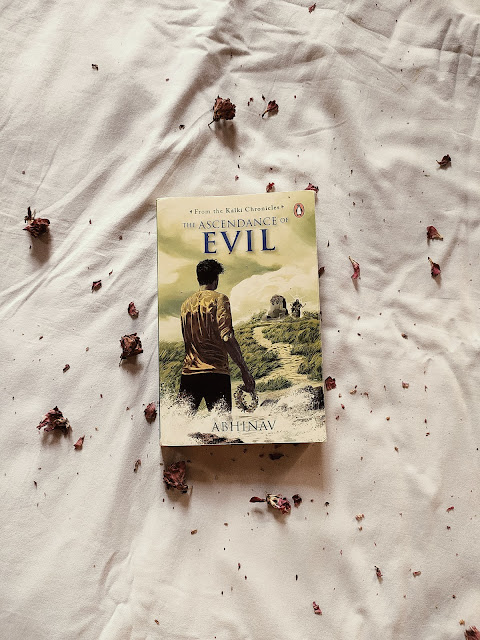The Ascendance of Evil by Abhinav is the third and concluding part of the Kalki Chronicles series. You can find
here the review of the first part, Sage’s Secret that I uploaded earlier on the blog. The second part is Kali’s Retribution, which I had skipped deliberately, seeking relatively more entertainment and suspense than what a normal reading would allow. And sure enough, I found it so. The character list had broadened, the writing style improved, the pace had drastically increased, and the plot became much more exciting with plenty of new elements, complexities and secrets.
The Ascendance of Evil focuses on the battle between Kali, the lord of evil and the Kalki avatar, which is to decide the future course of the planet and the universe. Kalki is accompanied by EOK (Espionage of Kalki, if I’m not wrong) soldiers and the Immortals. Whereas, Kali has an army of sorcerers and other dead Rakshasas. The great war of Kurukshetra—Mahabharata is the ultimate reference point, the Bhagwad Gita and other events serve as a guide. The book begins with the death of Kalki and the resurrection of Kali. This is just one of the several twists and total 180° shifts the book introduces.
“Despite having so many places of worship, there is a scarcity of goodness. On the other hand, even though I am not worshipped in any form or at any place, evil is present everywhere. It’s as if gods don’t exist at all.”
The plotline seems very natural and high-minded, addressing the prevalent issues related to humanity. It takes place in the year 2026 and the epilogue, 2050. Considering that the novel takes a didactic course towards the end, the author is being daringly hopeful with readers, vouching for humanity and degrading it at the same time.
With so many characters, all with unique significance puts a good weight on the storyline. Lord Krishna, his charm and his philosophy plays a key role throughout the book. His mystic personality and the way he sees the world and a soul and ‘being one with the universe’ truly shapes this novel’s heart. The war and combat scenes are complemented by illustrious writing and dark, mysterious settings, exactly opposite to the astral realm which is portrayed as nature’s refuge.
‘I am of that opinion that…Evil will be removed from this world and humans will be rescued by you, the God.’ To which Kalki replies, ‘You are so learned! Yet you fail to understand a simple truth…that humans are at the mercy of their fellow humans. Not at the mercy of gods…or Evil for that matter.’
I cannot stress enough how relevant the book is for this year in particular. I will tell you why. It smoothly carries out all the broad principles pertaining to spirit, purpose, nature, religions and so on. Some subjects like spirit, nature and the universe are discussed in depth with high morale. Whereas, others are merely abstract and superficial ideas but that is obvious since these are some most complex issues, or should I say, we have made them too complex to fix them. I commend how the author chose to deal with warfare, which is exactly what I found ground-breaking in this very specific genre. Nuclear threats, peace talks, money and power, rampant destruction of nature, wildfires and the appalling state of inaction. What is also unconventional is the redefinition of religion and god through long dialogues from the author’s mouthpiece, Kalki.
There is this chapter solely dedicated to matters of social issues we face daily. Although, for a chapter only, I am glad that this book addresses these issues and tells kids what things are absolutely wrong with individual micro-stories. This includes poverty, domestic violence, LGBTQ+ rights, human rights, caste divisions, and all kinds of divisions, religious hatred, divorce, honour killings, inequality, animal cruelty and more. As the author has forewarned, even after three decades, if the universe and nature still allow us to thrive, we WILL continue to endure these issues while also being part of these issues, jeopardizing the existence of other humans and species.
“Humankind knows the cost of their advancement. But they are ready to pay it, since it is not their wallet it is coming out of.”











